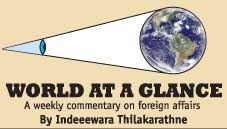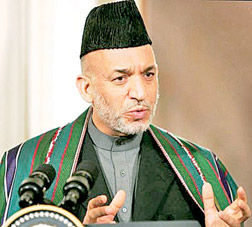|

Yes to Palestinian statehood
Efforts to stop the Palestinians from winning statehood at the UN are
misguided and self-defeating
The Palestinians are edging closer to getting a recognised state, at
least on paper. Their application to the UN's Security Council,
pencilled in for September 23rd, will be rebuffed by an American veto.
But if they then go to the UN General Assembly, which seems likely
sooner or later, the Palestinians will win an overwhelming majority. The
"observer" status that would be given to them would be similar to that
of the Vatican-a position short of full membership, which can be
conferred only by the Security Council. It would not make an immediate
difference on the ground but would help the Palestinians on their way to
the real thing by giving them a diplomatic fillip. It should be
encouraged, for reasons of both principle and practice.
The principle is simple: the Palestinians deserve a state, just as
the Israelis do. The United States, the European Union and the Israeli
government have all endorsed a two-state solution. There is broad
agreement that the boundary should be based on the pre-1967 one, with
land swaps allowing Israel to keep its biggest settlements close to the
line, in return for the Palestinians gaining land elsewhere; Jerusalem
should be shared; and the Palestinians should give up their claimed
right of return to Israel proper. That still leaves much room for
negotiation. But provided that the Palestinian request at the UN, still
unfiled as The Economist went to press, does not undermine the basic
terms of this deal, it is hard to see why any peacemaker, including
America's Barack Obama, should oppose a proposal that nudges Palestine
closer to real statehood.
Clashes in Yemen
Continuing clashes in Yemen's capital, Sana'a, have left at least 70
dead and hundreds injured. But the sudden upsurge in violence has not
brought the stricken, impoverished country at the heel of the Arabian
peninsula any closer to ending eight months of tense political
stalemate. The scale of the bloodshed, plus persistent unrest elsewhere
in the country, is instead amplifying fears that its stalled revolution
may slide into all-out civil war.
The protracted stand-off has pitted the ruling party, backed by army
units led by clansmen of President Ali Abdullah Saleh, against a motley
coalition that includes thousands of youths inspired by revolutions
elsewhere in the Arab world, secular opposition parties, Islamist groups
and defectors from the national army. Since March, when snipers loyal to
Saleh killed 52 unarmed demonstrators in a single day, protests had been
confined mainly to limited areas of Sana'a while negotiators sought to
coax the president into retirement. Mr Saleh, who seized power in 1978,
has so far balked, despite narrowly surviving a bomb in June that left
him severely burned and forced him to fly for medical treatment in Saudi
Arabia, where he remains.
Rabbani funeral in Kabul
The funeral of Afghanistan's peace talks chief Burhanuddin Rabbani,
killed by a suicide bomber, has taken place in Kabul amid tight
security.
 President
Hamid Karzai joined mourners for the state funeral at the presidential
palace. President
Hamid Karzai joined mourners for the state funeral at the presidential
palace.
Rabbani's body was then buried amid emotional scenes on a Kabul
hilltop. Rabbani, the chairman of the High Peace Council, was killed on
Tuesday by a bomb hidden in a turban worn by a man claiming to be a
Taliban envoy.
Karzai told the mourners he would continue with the peace process.
"The blood of the martyred and other martyrs of freedom requires us to
continue our efforts until we reach peace and stability," he said.
The funeral went from the quiet dignity of a ceremony with a military
honour guard in the presidential palace to chaos and passion as the
coffin was passed hand-to-hand and buried in a hilltop site in the
north-east of Kabul.
In the palace, President Karzai made a brief oration, detailing the
achievements of Dr Rabbani and saying his work as a peace negotiator
would go on. Prayers were led by another Islamic cleric who became a
mujahideen commander, Abdul Rasul Sayyaf, before the coffin was taken
away to cross a capital cleared of all other traffic.
Even before the coffin arrived at the Bemaru hill burial site, police
fired into the air to disperse a crowd chanting "death to America, death
to Pakistan". Thousands pressed to touch the coffin, draped in an Afghan
flag, as bearers pushed their way through to the burial place.
At the graveside, Abdullah Abdullah, a close political ally of Dr
Rabbani, and another veteran mujahideen commander, Ishmael Khan, led
mourners as the coffin was lowered in a feverish atmosphere. |

